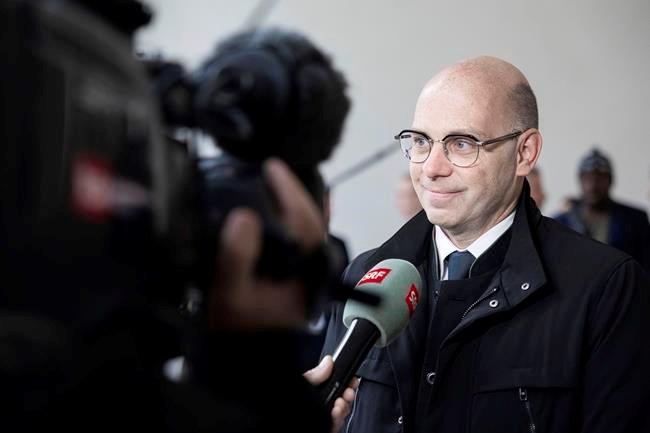GENEVA (AP) — Switzerland’s top criminal court on Wednesday convicted a former interior minister of Gambia for crimes against humanity over his role in repression committed by the west African country’s security forces under its longtime dictator, a legal advocacy group said.
Ousman Sonko, Gambia’s interior minister from 2006 to 2016 under then-President Yahya Jammeh, was sentenced to 20 years in prison, TRIAL International said on the social media platform X, formerly Twitter.
The trial, which began in January, was seen by advocacy groups as an opportunity to reach a conviction under “universal jurisdiction,” which allows for the prosecution of serious crimes committed abroad.
The verdict was read out in Swiss federal criminal court in the southern town of Bellinzona on Wednesday. Sonko, who was in the courtroom, offered little reaction when a translation of the verdict was read out in English, said TRIAL International's legal adviser Benoit Meystre, who also attended the proceedings.
Sonko applied for asylum in Switzerland in November 2016 and was arrested two months later.
The Swiss attorney general’s office said the indictment against Sonko, filed a year ago, covered alleged crimes during 16 years under Jammeh, whose rule was marked by arbitrary detention, sexual abuse and extrajudicial killings.
Sonko was accused of supporting, participating in and failing to stop attacks against opponents in Gambia, an English-speaking West African country that is surrounded by neighboring Senegal. The crimes included killings, torture, rape and numerous unlawful detentions, prosecutors said.
“This unprecedented conviction based on universal jurisdiction in Europe is the confirmation that no one is above the reach of justice,” Meystre said in a text message. “Even the most powerful figures can be brought to account for their participation in mass atrocities.”
Madi MK Ceesay, an award-winning journalist who was once arrested under Sonko's orders and who testified in the trial, said the verdict would likely send a strong signal to Jammeh, who remains in exile in Equatorial Guinea.
“The trial demonstrates that no matter what, the long arm of justice can always catch the perpetrator,” Ceesay told The Associated Press.
Reed Brody, an American human rights lawyer who attended the trial, said Sonko's conviction was a pivotal step toward justice for Jammeh’s victims.
“The long arm of the law is catching up with Yahya Jammeh’s accomplices all around the world, and hopefully will soon catch up with Jammeh himself,” he said.
Sonko was convicted of homicide, torture and false imprisonment as crimes against humanity, while rape charges against him were dropped, Brody wrote on X.
Philip Grant, executive director at TRIAL International, which filed the Swiss case against Sonko before his arrest, said he was the highest-level former official ever to be put on trial in Europe under the principle of universal jurisdiction.
Sonko, who joined the Gambian military in 1988, was appointed commander of the State Guard in 2003, a position in which he was responsible for Jammeh’s security, Swiss prosecutors said. He was made inspector general of the Gambian police in 2005.
He was removed as interior minister in September 2016, a few months before the end of Jammeh’s government, and left Gambia to seek asylum in Europe.
Ousman Sonko is not to be confused with leading politician Ousmane Sonko in Senegal, who spells his first name slightly differently.
Jammeh seized control in a 1994 coup. He lost Gambia’s 2016 presidential election but refused to concede defeat to Adama Barrow, and ultimately fled amid threats of a regional military intervention to force him from power.
“The verdict against Ousman Sonko is a milestone in the fight against impunity and a historic success for universal jurisdiction in Switzerland and Europe,” Amnesty Switzerland wrote on X. “Even former ministers can be prosecuted! Victims and their families finally see justice.”
___
John reported from Serrekunda, Gambia.
Jamey Keaten And Abdoulie John, The Associated Press



